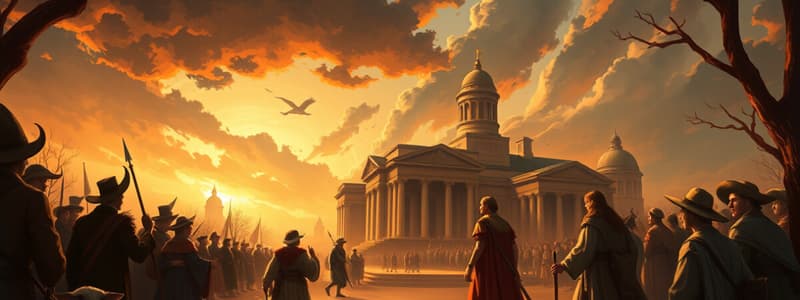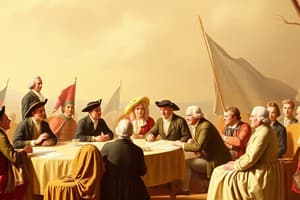Podcast
Questions and Answers
What was the Constitutional Convention?
What was the Constitutional Convention?
A convention of delegates from all the states except Rhode Island that met in Philadelphia, Pennsylvania, in May of 1787.
What role did the Articles of Confederation serve?
What role did the Articles of Confederation serve?
They served as the written document that established the functions of the national government of the United States after it declared independence from Great Britain.
Which of the following are weaknesses of the Articles of Confederation? (Select all that apply)
Which of the following are weaknesses of the Articles of Confederation? (Select all that apply)
- Congress had power to tax
- No central leadership (executive branch) (correct)
- Changes required unanimous consent of 13 states (correct)
- Congress had no power to enforce its laws (correct)
What was the Great Compromise?
What was the Great Compromise?
What did the Virginia Plan aim to achieve?
What did the Virginia Plan aim to achieve?
What was the New Jersey Plan?
What was the New Jersey Plan?
What did the Three-Fifths Compromise determine?
What did the Three-Fifths Compromise determine?
What is the Commerce Compromise?
What is the Commerce Compromise?
What is the Constitution?
What is the Constitution?
Who were the Federalists?
Who were the Federalists?
Who were the Anti-Federalists?
Who were the Anti-Federalists?
What are the Federalist Papers?
What are the Federalist Papers?
What is a republic?
What is a republic?
What is popular sovereignty?
What is popular sovereignty?
What does federalism refer to?
What does federalism refer to?
Who is Baron de Montesquieu?
Who is Baron de Montesquieu?
What are checks and balances?
What are checks and balances?
Flashcards are hidden until you start studying
Study Notes
Constitutional Convention
- Delegates from all states, except Rhode Island, convened in Philadelphia, Pennsylvania in May 1787 to address issues in governance.
Articles of Confederation
- Served as the initial written framework for the national government of the United States post-independence from Great Britain.
Weakness of the Articles of Confederation
- Lack of central leadership due to no executive branch.
- Congress could not enforce laws or tax, and had no authority to regulate trade.
- No national court system existed, and amendments required unanimous consent from all 13 states.
Great Compromise
- Established a bicameral legislature; lower house had proportional representation, while the upper house provided equal representation for states.
Virginia Plan
- Proposed representation in Congress based on state population.
- Suggested a strong national government with three branches: legislative, executive, and judicial.
New Jersey Plan
- Aimed to safeguard small states' interests by assigning each state one vote in Congress.
- Introduced a unicameral legislature where each state had equal representation.
Three-Fifths Compromise
- Determined that three out of every five enslaved individuals would be counted for state population, impacting legislative representation and taxation.
Commerce Compromise
- Granted Congress the power to regulate foreign and interstate commerce, balancing national governance without risking fundamental rights.
Constitution
- Established as the supreme law of the land, establishing a framework for a strong national government while protecting individual rights.
Federalist
- Supporters of the Constitution who advocated for a robust national government.
Anti-Federalist
- Opponents of the Constitution who favored weaker national control and stronger state governance.
Federalist Papers
- Series of eighty-five essays written to encourage New York citizens to support the ratification of the U.S. Constitution.
Republic
- A government form where officials are elected by the people, emphasizing popular sovereignty—the authority is based on the consent of the governed.
Popular Sovereignty
- Concept whereby the government derives its power from the consent of the people, necessitating approval by nine states for the Constitution's enactment.
Federalism
- Describes the division of power between national and state governments, allowing both levels to govern concurrently.
Baron de Montesquieu
- Introduced the concept of separation of powers to prevent any one branch of government from gaining excessive authority.
Checks and Balances
- A system ensuring that separate branches of government can limit each other's powers, fostering collaboration and accountability.
Judicial Review
- The authority of courts to invalidate legislation or executive actions deemed unconstitutional.
Studying That Suits You
Use AI to generate personalized quizzes and flashcards to suit your learning preferences.




